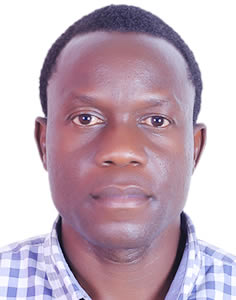 Dr. Isaac Newton Alou, PhD (University of Pretoria), MSc (Mak), BSc (Mak)
Dr. Isaac Newton Alou, PhD (University of Pretoria), MSc (Mak), BSc (Mak)
Lecturer
Department of Soil and Land Use Management (DeSOLUM), School of Agricultural Sciences, College of Agricultural and Environmental Sciences, Makerere University, Makerere University
Isaac Newton Alou serves is a lecturer in the School of Agricultural Sciences. Newton is a scholar in soil science with a bias in crop modelling. He is lead instructor in course units related to soil physics for undergraduate and graduate students. Newton also co-instructs hydrological processes and modelling among other course units. He has a passion in environmental biophysics. Currently Newton is responsible for the soil physics laboratory in the soil science laboratories. He aspires to advance improvements in agricultural production and environmental quality through innovative and demand driven technologies in water management and plant nutrition. He has keen interest in developing adaptive instruments and or tools to aid decisions of the average African farmer. His research has been in the fields of soil fertility, irrigation, agronomy and crop modelling where some students are now involved on topics related to irrigation, soil water dynamics and site-specific nutrient management. Newton’s early career has been at research and development institutions like IITA-Uganda, NARO groups e.g. AgMIP.org on low input maize systems. He is engaged in training, research and outreach projects with these institutions: Iowa State University (ISU), University of Pretoria (UP), University of Sheffield, and University of Ghana.
He graduated with a first class B.Sc. degree in Agriculture from Makerere University. Heworked on maize response to fallow residues and inorganic nitrogen on a Kandiudalf. He did my M.Sc. Soil Science at Makerere University and my research focussed on biophysical and crop management gradients driving within farm variability highland bananas yields. He did my Ph.D. in soil science at University of Pretoria on strategies to bridge yields gaps of upland rice production systems in an African equatorial zone. Towards the end of his Ph.D. training program, he worked with a team of modellers across the globe in the AgMIP.org on maize, where he contributed to key recommendations to guide future research agenda on coping with climate change in African agriculture. He was a co-principal investigator on improving automated irrigation systems to alleviate salt and water stresses for enhanced greenhouse tomato production at the Rural Development Administration in South Korea. At present, he is involved in building a research team for a project adaptive water and nitrogen management in upland rice under the Worldwide Universities Network (WUN). He has some students interested in soil-plant water relations, some have completed research projects on managing water in vegetables and highland bananas while others are embarking similar areas for other high value crops. Download attachment below for more details.

